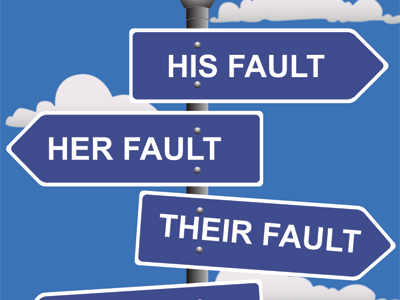Why is your win-rate so low in federal and state opportunities? Whose fault is it?
How many times have your asked yourself and your staff, “Why did we lose that last bid, we had a perfect solution…”? Obviously, you cannot expect to win all those proposals but if you are losing most of the time and your win-rate is low and is not getting better, then you have a problem. Do not blame the government for a difficult RFP, do not blame the competition, and do not blame your proposal team for not being good. No, you are the problem. My finger is pointed towards BD directors, executives, and management of the company. Yes, it is your fault.
Here is a small test to consider. Pick your choices:
1. When selecting a proposal writer,
a. you give priority to one with subject matter expertise (in your business)
b. you give priority to a proposal writer with more years of experience
2. Which do you prefer,
a. an in-house proposal writer
b. more capable outside consultant
3. Are your proposals written by
a. project managers, engineers and other staff
b. dedicated proposal writers who have gone through classical training on proposal writing
Have you yourself gone through a proposal writing startup course?
a. no
b. yes
If you selected “a” for any of the above questions, then I think I am right in blaming you.
A few days ago, an IT company’s BD Vice President called me and said that he is looking for a good proposal writer and that he has been losing in most his federal bids. His first question, though, was whether I had written proposals on his specific content management software. He said, “I want somebody who knows the software inside out. If you don’t know the software, you won’t bring in any new value for me.” That is one of the mentalities that is making companies lose. They think that the reason for losing is that their proposal team is not technical enough. They will go in a hunt for proposal writers with “more technical capabilities” and they will continue to lose. These executives think that a proposal writer is just a good technical writer with a few tip and tricks and knowledge on how to right a good proposal.
Am I saying that it is not good for the proposal writer(s) to be subject matter expert(s)? No. However, that will not get you a winning proposal. In my 25 years of experience in proposal writing, I have often seen proposals with truly outstanding solutions lose to proposals with weaker solutions. Reason: the proposal with lesser quality solution portrayed itself so well, that its strengths just outweighed its weaknesses; what the other proposal was unable to do. They had the better proposal writer, not the better solution.
Another very wrong notion I have heard many times from managements is that it is better for us to have an in-house proposal writer, even if he is weaker, than having a strong outside proposal support. At the heart of this thought, it is negating the significance of the proposal writer and proposal writing and is saying that the management’s input is more important. Am I disputing the fact that management participation in the proposal writing is not necessary? Of course not, it is a must. But let’s face it, in most companies that have in-house proposal teams, the management does not get involved much or at all. With management participation or without it, it is indeed the proposal writer (team) who is the crucial factor for bringing you a winning proposal. You might decide to have in-house staff due to financial consideration (which I will dispute in another article) but you must understand that you are lowering your win-rate when you chose a less capable proposal writer.
What I want to arrive at is that writing winning proposals is a distinct professional capability; you must acknowledge this reality or you are not successful. You cannot put one of your free construction project managers to write your next construction proposal; nor can you ask your IT engineer to writer your IT proposals.
At the beginning of this writing, I blamed the management for companies losing their bids. If they want to start on a winning cycle, then they are the first that need to be educated about the art and science of proposal writing. All successful firms have gone through this process. At some point, they have realized the importance of proposal writing in their bidding process and have paid the price; that price is using professional proposal writers as well as educating the management on the proposal process. You can do that, too.

